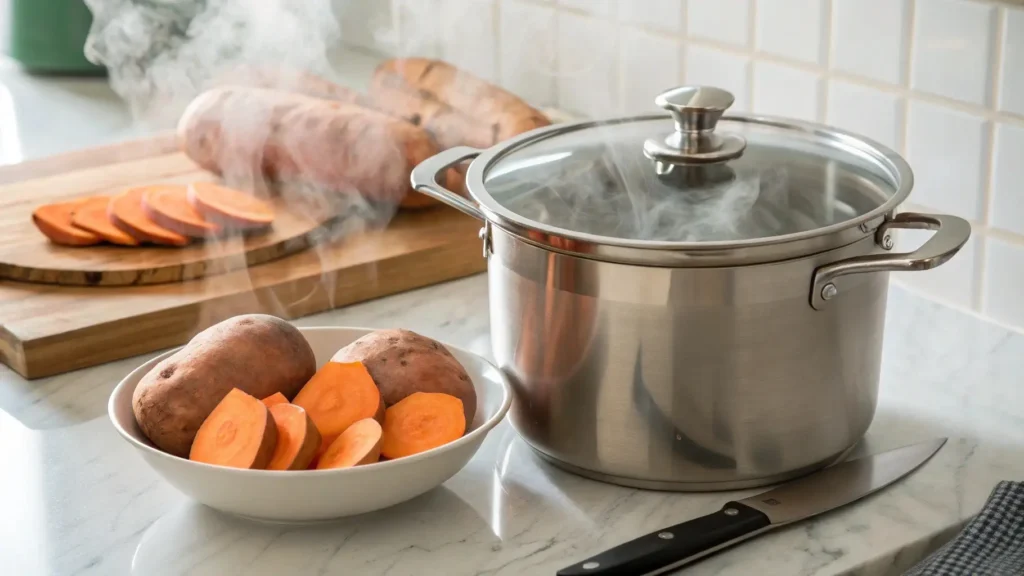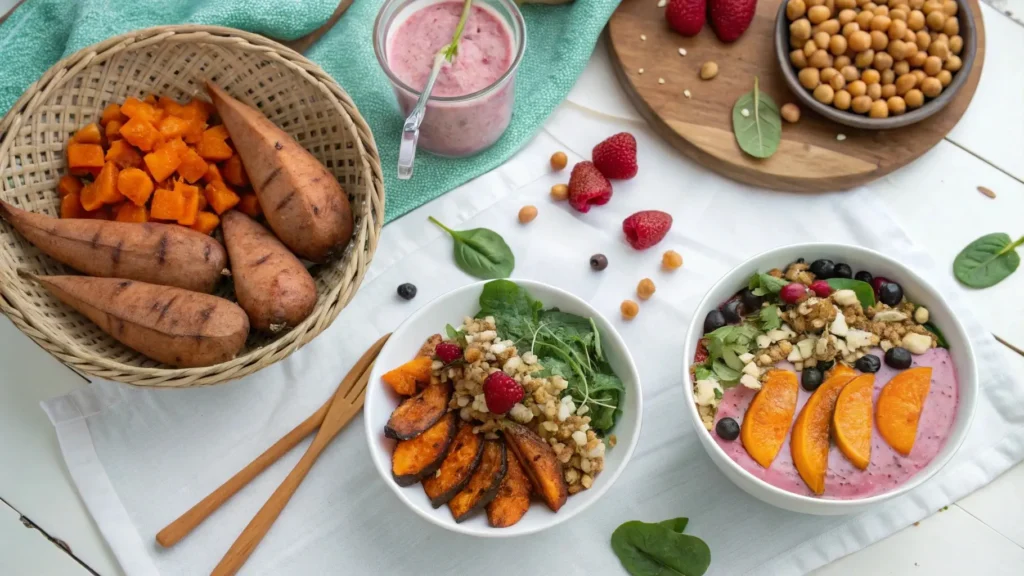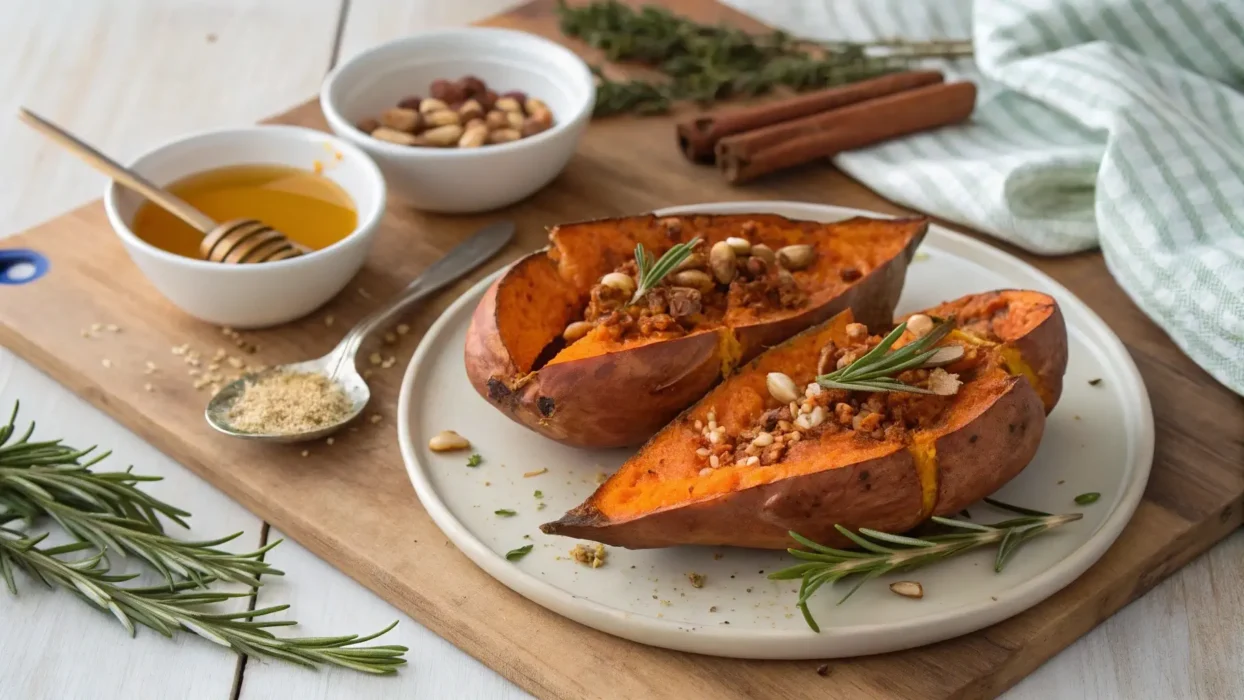Introduction: What is the healthiest way to eat a sweet potato?
Sweet potatoes are often overshadowed by their starchy cousins, the regular potatoes, but trust me, they deserve their time to shine. Not only are they delicious, but they also pack a punch when it comes to nutrients. If you’re looking for something that’s tasty, healthy, and versatile, sweet potatoes are where it’s at. Whether you’re mashing them, roasting them, or sneaking them into cornbread (yes, please!), they offer a ton of benefits that make them a must-have in your kitchen. So, let’s dive into why sweet potatoes aren’t just another root vegetable—they’re a nutritional powerhouse.
Table of Contents
Why Sweet Potatoes Are Good for You: Health Benefits of Sweet Potatoes
When it comes to health, sweet potatoes really bring their A-game. These tubers are loaded with vitamins, minerals, and fiber that support everything from your immune system to your digestive health. It’s honestly no wonder why sweet potatoes have been a staple in many cultures for centuries. They’ve earned their spot in the spotlight with these standout benefits:
- Rich in Vitamins A and C: Sweet potatoes are packed with vitamin A, which is key for healthy vision and immune function. They also have vitamin C, which helps with collagen production and keeps your skin looking fresh.
- Full of Fiber: A high fiber content means sweet potatoes help keep your digestive system running smoothly. Plus, fiber helps you feel fuller longer, making sweet potatoes a great option for anyone looking to stay satisfied between meals.
- High in Antioxidants: Sweet potatoes, especially the purple varieties, are rich in antioxidants that help fight off free radicals. This can reduce inflammation and promote overall health.
So, whether you’re aiming to boost your immune system or simply want a healthier side dish, sweet potatoes are the way to go.
Nutrient Profile of Sweet Potatoes: Carbohydrates, Fiber, Protein, Vitamins A and C, and More
Here’s a quick breakdown of what you’re getting when you eat sweet potatoes:
- Carbohydrates: Sweet potatoes are a great source of healthy carbs, giving you sustained energy without the sugar crash.
- Fiber: A medium-sized sweet potato can give you around 4 grams of fiber—helping with digestion and supporting heart health.
- Protein: They have a small but significant amount of protein compared to other vegetables—about 2 grams per serving.
- Vitamins A and C: These vitamins are essential for maintaining healthy skin, immune function, and vision. One medium sweet potato can provide more than 400% of your daily recommended intake of vitamin A!
So yeah, sweet potatoes are more than just a delicious side dish—they’re a nutrient-dense food that can help support a healthy lifestyle.
The Healthiest Ways to Cook Sweet Potatoes: What Methods Retain the Most Nutrients?

Now, we know sweet potatoes are loaded with nutrients, but did you know how you cook them can affect their health benefits? Some methods retain more nutrients than others, so let’s break down the healthiest ways to prepare them without losing all those good-for-you vitamins.
Baking Sweet Potatoes: Why Baking is One of the Healthiest Methods
Baking sweet potatoes is one of the healthiest methods because it helps preserve the vitamins and minerals without added fat. Plus, the natural sweetness really shines through when they’re baked. You can bake them whole or cut them into wedges, depending on your preference. Pro tip: don’t peel the skin! The skin contains a lot of the fiber and nutrients, so keeping it on will give you a bigger nutritional boost.
Steaming Sweet Potatoes: The Benefits of Steaming for Nutrient Retention
Steaming sweet potatoes is another fantastic method if you want to retain as many nutrients as possible. When you steam them, they don’t lose their vitamins and minerals to the water, which can happen with boiling. It’s also a quick and easy way to cook sweet potatoes while keeping them soft and creamy. Honestly, steaming is one of my go-to methods when I want to make sure I’m getting the most out of every bite.
Roasting Sweet Potatoes: Flavor and Nutrient Retention with Roasting
Roasting is hands-down one of the best ways to bring out the natural sweetness of sweet potatoes. The caramelization process gives them a rich, deep flavor that’s perfect for savory or sweet dishes. Roasting doesn’t strip away the nutrients either, especially if you roast them with the skin on. Plus, the crispy edges? Totally irresistible.
Grilling Sweet Potatoes: Grilling as a Healthier Option: Tips and Techniques
Grilling sweet potatoes is a fantastic option if you’re looking for that smoky, charred flavor. Grilled sweet potatoes can make a great addition to salads or just served as a side dish. The key is to slice them into even pieces so they cook thoroughly without burning. Grilling also helps preserve the nutrients, making it a tasty and health-conscious method.
What to Avoid When Cooking Sweet Potatoes: Common Mistakes and How to Prevent Them
While sweet potatoes are pretty easy to work with, there are a few common mistakes people make when cooking them. Let’s avoid those pitfalls, so you can enjoy all the health benefits without any setbacks.
Overcooking or Boiling Sweet Potatoes: How Overcooking Can Lead to Nutrient Loss
One thing you want to avoid is overcooking or boiling sweet potatoes for too long. When you boil sweet potatoes, a lot of the nutrients leach into the water, which means you’re not getting all the vitamins and minerals you paid for. So, if you’re boiling them, try to keep the cooking time to a minimum. And if you can, consider steaming or baking them to retain more of their nutrients.
Avoiding Unhealthy Toppings:
Choosing the Right Toppings for Maximum Health Benefits
Another common mistake is loading up sweet potatoes with sugary or fatty toppings. It’s tempting to add butter, marshmallows, or brown sugar, but these additions can cancel out some of the health benefits. Instead, try a drizzle of olive oil, a sprinkle of cinnamon, or even a dollop of Greek yogurt for a healthier alternative. That way, you can keep the sweet potato’s natural goodness intact.
Health Benefits of Eating Sweet Potatoes Regularly:

The Role of Sweet Potatoes in Long-Term Health
Sweet potatoes aren’t just a tasty side dish—they’re also packed with health benefits that can improve your long-term well-being. Eating sweet potatoes regularly can help support your body in a number of ways, from boosting your immune system to promoting good digestion. Plus, with all the vitamins, fiber, and antioxidants they offer, these little root veggies can play a role in everything from heart health to better vision. Let’s break down exactly why adding sweet potatoes to your diet is a smart choice for your long-term health.
Sweet Potatoes and Digestive Health:
High Fiber Content and Its Impact on Digestion
If you’ve ever struggled with digestive issues, sweet potatoes could be your new best friend. These humble vegetables are rich in dietary fiber, which is essential for keeping your digestive system in tip-top shape. Fiber helps regulate bowel movements, prevent constipation, and support healthy gut bacteria. It’s also a great way to keep your stomach feeling fuller for longer, which can help you maintain a healthy weight. So, whether you’re dealing with bloating or just want to feel a little lighter, sweet potatoes are a great addition to your meals.
And let’s not forget, fiber also supports heart health by lowering cholesterol levels and reducing the risk of heart disease. So, not only are you helping your digestion, but you’re also supporting your overall cardiovascular health. It’s a win-win!
Sweet Potatoes and Eye Health:
The Role of Vitamin A in Eye Health and Vision
We’ve all heard that carrots are good for your eyes, but did you know that sweet potatoes are even better for eye health? Sweet potatoes are loaded with beta-carotene, which is a precursor to vitamin A. Vitamin A plays a crucial role in maintaining good vision, especially in low-light conditions. It’s also an important nutrient for protecting your eyes from age-related conditions like macular degeneration.
But that’s not all—vitamin A is also great for keeping the surface of your eyes healthy, preventing dryness and irritation. So, if you want to keep your eyes sharp as you get older, adding sweet potatoes to your diet is a simple and delicious way to protect your vision for the long haul.
Can You Eat Sweet Potatoes on a Diet?
Including Sweet Potatoes in Weight Loss and Balanced Diet Plans
Here’s the big question: can you eat sweet potatoes if you’re trying to lose weight? The answer is yes—absolutely! In fact, sweet potatoes can be an excellent part of a weight-loss or balanced diet. They’re nutrient-dense, meaning they provide a lot of vitamins and minerals for relatively few calories. Plus, they’re full of fiber, which helps you feel full and satisfied for longer periods, reducing the chances of snacking or overeating.
Sweet potatoes also have a low glycemic index (GI), which means they cause a slower rise in blood sugar levels, making them a great option for anyone looking to maintain stable energy levels throughout the day. This makes them a great carb choice for anyone trying to lose weight while still getting the nutrition they need.
Low-Carb and Keto-Friendly Sweet Potato Recipes:
Sweet Potatoes in Keto Diets
Now, if you’re following a low-carb or keto diet, you might be wondering if sweet potatoes are off-limits. While they’re higher in carbs than some other veggies, sweet potatoes are still a healthier choice than white potatoes, especially when you consider their fiber and nutrient content. If you’re looking for ways to enjoy them while sticking to a low-carb or keto diet, there are plenty of creative ways to include sweet potatoes in moderation.
For example, you can make low-carb sweet potato hash with a mix of other vegetables, or bake thin slices of sweet potato for a healthier alternative to chips. You don’t have to cut sweet potatoes out completely—you can still enjoy them in smaller portions, making sure they fit into your overall carb limit. The key is balance, so enjoy sweet potatoes in a way that works with your diet plan.
Sweet Potatoes and Blood Sugar Control:
How Sweet Potatoes Can Help Stabilize Blood Sugar Levels
Another reason to love sweet potatoes? They can actually help stabilize your blood sugar levels, making them a great food for people with diabetes or anyone looking to manage their blood sugar more effectively. Unlike foods with a high glycemic index, sweet potatoes have a moderate GI, which means they cause a slower, more gradual rise in blood sugar levels.
The fiber content in sweet potatoes also plays a role in regulating blood sugar. Fiber helps slow down the absorption of sugar into the bloodstream, preventing those pesky blood sugar spikes that can leave you feeling sluggish. This makes sweet potatoes a great option for anyone who wants to keep their energy levels stable throughout the day.
FAQs About Eating Sweet Potatoes:
Sweet potatoes are delicious and packed with nutrients, but there are probably a few questions you have about them, especially when it comes to preparing and eating them. Don’t worry—I’ve got the answers to your burning questions right here! From whether or not you can eat them raw to the difference between southern and sweet cornbread, let’s clear up some of the confusion.
Can You Eat Sweet Potatoes Raw? Are Raw Sweet Potatoes Safe to Eat?
You might be wondering, “Can I just eat sweet potatoes raw?” Technically, yes, sweet potatoes are safe to eat raw, but they’re not exactly the most appetizing raw veggie. They have a tough, starchy texture, and the flavor might not be as sweet as you expect. Plus, raw sweet potatoes can be harder to digest compared to when they’re cooked.
That said, if you do decide to eat them raw, be sure to peel the skin off first and cut them into thin slices. If you want to get creative, you could even toss them in a salad for a crunchy bite. But for the best flavor and digestibility, cooking them is the way to go!
How Often Should I Eat Sweet Potatoes? Ideal Frequency for Including Sweet Potatoes in Your Diet
Sweet potatoes are packed with health benefits, but like anything, moderation is key. Eating them 2–3 times a week is a great way to get their nutrients without overdoing it. They’re a healthy carb, but they still contain calories, so balance is important—especially if you’re watching your calorie intake.
If you’re looking to incorporate them more into your diet, try swapping them in for other starchy sides like white potatoes, rice, or pasta. You’ll get a deliciously sweet flavor and a nutritional boost without getting bored of your usual routine.
What is the Difference Between Southern Cornbread and Sweet Cornbread?
Ah, the age-old debate—southern cornbread vs. sweet cornbread! Southern cornbread is typically savory and made with minimal sugar, often using buttermilk and a mix of cornmeal and flour. It’s more crumbly and a bit dryer, making it perfect for soaking up gravies or alongside stews.
Sweet cornbread, on the other hand, is often a bit sweeter thanks to added sugar or honey. It’s moist and soft, with a slightly cake-like texture. If you want a more dessert-like cornbread that could almost pass as a treat, sweet cornbread is your go-to. They’re both delicious, but the key difference lies in the sweetness and the texture!
Why Do You Soak Sweet Potatoes Before Baking?
Soaking sweet potatoes before baking isn’t always necessary, but some people do it to help reduce cooking time and make them even sweeter. The idea behind soaking is that it helps to draw out some of the starch, leaving the sweet potatoes more tender and allowing them to cook faster. If you’re planning to roast or bake them, soaking can give you a slightly softer texture and help them caramelize better.
If you don’t have time to soak them, no big deal—sweet potatoes will still come out great. But if you’re looking to get the most tender, flavorful result, soaking for 30 minutes or so can work wonders.
Is Sweet Potato a Good Substitute for Bread?
Sweet potatoes are a great substitute for bread in certain recipes, especially for those following gluten-free or low-carb diets. You can use roasted or mashed sweet potatoes as a base for sandwiches or to make a “bread” for breakfast dishes. Sweet potato toast, where you slice the potato and toast it in the oven, is one creative way to get your bread fix while cutting down on carbs.
It’s not an exact replacement for bread (you won’t get that same chewy texture), but sweet potatoes can be a healthy and delicious alternative if you’re looking to mix things up.
What Does Patti LaBelle Put in Her Sweet Potato Pie?
If you’ve ever tasted Patti LaBelle’s famous sweet potato pie, you know it’s something special. Patti’s recipe has a secret that makes it extra creamy and flavorful—she adds evaporated milk, butter, brown sugar, cinnamon, nutmeg, and a little vanilla extract. This combination gives her pie that perfect balance of sweet and spicy flavors, with a velvety smooth texture.
And, of course, like any good sweet potato pie, the sweet potatoes themselves are the star of the show. They add that natural sweetness and creaminess that make the pie so irresistible. Patti’s pie is so beloved that it’s practically a holiday tradition for many people!
Conclusion
Sweet potatoes aren’t just a tasty addition to your meals—they’re a powerhouse of nutrients that support your health in so many ways. From promoting digestive health to boosting your vision and managing blood sugar, these vibrant orange veggies are a must-have in any well-rounded diet. Whether you enjoy them baked, roasted, or mashed, sweet potatoes are easy to prepare and offer a delicious, nutritious alternative to other starchy foods.
So, next time you’re looking for a healthy side dish or snack, don’t hesitate to reach for a sweet potato. Whether you’re following a specific diet or just looking to eat better, sweet potatoes can easily fit into your meal plan. And with their versatility, you’ll never run out of ways to enjoy them. Just remember, moderation is key, and balance is the name of the game—so enjoy sweet potatoes regularly, and your body will thank you!

